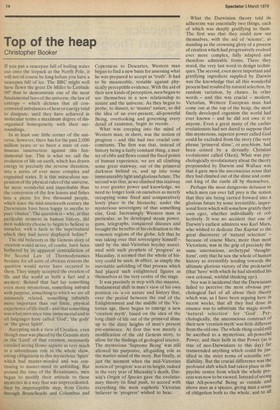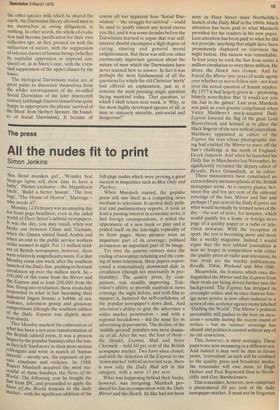Top of the heap
Christopher Booker
If you put a saucepan full of boiling water out onto the icepack at the North Pole, it will not of course be long before you have a saucepan full of ice. The BBC might well have flown the great Dr Miller to Latitude 90° thus to demonstrate one of the most fundamental laws of the universe, the law of entropy — which dictates that all concentrated imbalances of heat or energy tend to dissipate, until they have achieved in molecular terms a maximum degree of disorganised homogeneity with their surroundings.
In at least one little corner of the universe, however, there has for the past 2,000 million years or so been a state of continuous insurrection against this fundamental law. This is what we call the evolution of life on earth, which has drawn energy in precisely the reverse direction, into a series of ever more complex and organised states. It is this miraculous suspension of the physical rules of the universe, far more wonderful and improbable than the conversion of the few loaves and fishes into a picnic for five thousand people, which since the mid-nineteenth century the Darwinians have been happy to ascribe to pure 'chance'. The question is— why, at that particular moment in human history, did men suddenly choose to begin to believe in miracles, with a faith in the supernatural which they had never displayed before?
The old believers in the Genesis story of creation would never, of course, have been bothered by its apparent contradiction of the Second Law of Thermodynamics because for all sorts of obvious reasons the question would never have occurred to them. They simply accepted the creation of life and the world as both a fact and a mystery. Behind that fact lay something even more mysterious, something imbued with purpose, something to which we are all intimately related, something infinitely more important than our finite, physical experience of life itself— and that something was what men since time immemorial and in all languages have called 'God', 'the gods' or 'the great Spirit'.
Accepting such a view of Creation, even though man was placed by the Genesis story as the 'Lord' of that creation, necessarily entailed seeing Homo sapiens as very much in a subordinate role in the whole show, owing obligations to this mysterious 'Spirit' which had master-minded and was continuing to master-mind its unfolding. But around the time of the Renaissance, men began to modify their attitude to these mysteries in a way that was unprecedented. Step by imperceptible step, from Giotto through Brune lleschi and Columbus and Copernicus to Descartes, Western man began to find a new basis for assessing what he was prepared to accept as 'truth'. It had to be measurable, testable against physically perceptible evidence. With the aid of their new kinds of perception, men began to see themselves in a new relationship to nature and the universe. As they began to probe, to dissect, to 'master' nature, so did the idea of an ever-present, all-powerful Being, overlooking and governing every detail of existence, begin to recede.
What was creeping into the mind of Western man, in short, was the notion of progress — and this had two crucial concomitants. The first was that, instead of history being a fairly constant thing, a matter of ebbs and flows round the fixed points of human experience, we are all climbing some great stairway, out of the primeval darkness behind us, and up into some immeasurably light and glorious future. The second was that, as we climbed this stairway to ever greater power and knowledge, we need no longer look on ourselves as merely occupying some fixed and comparatively lowly place in the hierarchy, under the mysterious sovereignty of that something else, God. Increasingly Western man in particular, as he developed steam power, guns, telegraphs, conquered diseases and brought the benefits of his civilisation to the remotest regions of the globe, felt that he was taking over that sovereignty himself — until by the mid-Victorian heyday associated with such prophets of 'progress' as Macaulay, it seemed that the whole of history could be seen, in effect, as simply the inevitable unfolding of that process which had placed such enlightened figures as themselves at the very centre of the stage.
It was precisely in step with this massive, fundamental shift in man's view of his own position vis-'a-vis nature and history that, over the period between the end of the Enlightenment and the middle of the Victorian age, there began to emerge a new 'creation myth', based on the idea of the long climb of life out of the primeval slime up to the dizzy heights of man's present pre-eminence. At first this was merely a modification of the old Genesis story, to allo-w for the findings of geological science. The mysterious 'Supreme Being' was still allowed his purposive, all-guiding role as the master-mind of the story. But finally, at just the moment when the mid-Victorian notion of 'progress' was at its height, indeed in the very year of Macaulay's death, Darwin's Origin of Species gave the evolutionary theory its final push, to accord with everything the most euphoric Victorian believer in 'progress' wished to hear. What the Darwinian theory told its adherents was essentially two things, each of which was deeply gratifying to them. The first was that they could now see themselves, with the aid of 'science', as standing as the crowning glory of a process of creation which had progressively evolved ever more complex, fully adapted and therefore admirable forms. There they stood, the very last word in design techniques. The second, even more important and gratifying ingredient supplied by Darwin was the knowledge that all this wonderful process had resulted by natural selection, by random variation, by chance. In other words — and this was crucial — modern, Victorian, Western European man had come out at the top of the heap, the most finely developed organism the world had ever known — and he did not owe it to anyone. Even a great many of the earlier evolutionists had not dared to suppose that this mysterious, superior power called God could be excluded from the story (the very phrase 'primeval slime', or urschleim, had been coined by a devoutly Christian evolutionist called Oken). What was psychologically revolutionary about the theory propounded by Darwin and Wallace was that it gave men the unconscious sense that they had climbed out of the slime and come out king of the castle all by themselves.
Perhaps the most dangerous delusion to which men can ever fall prey is the notion that they are being carried forward into a glorious future by some irresistible, impersonal force which will somehow gratify their own egos, whether individually or collectively. It was no accident that one of Darwin's earliest admirers was Karl Marx, who wished to dedicate Das Kapital to the great discoverer of 'natural selection' — because of course Marx, more than most Victorians, was in the grip of precisely the same unconscious, archetypal 'thoughtform', only that he saw the whole of human history as irresistibly tending towards the ultimate glorious victory of the proletariat (that 'hero' with which he had identified his own colossal, wishful-thinking ego).
Nor was it incidental that the Darwinians failed to perceive the most obvious psychological fact of all about their theorY which was, as I have been arguing here in recent weeks, that all they had done in essence was to substitute the magic words 'natural selection' for 'God'. Psychologically, the unconscious construct of their new 'creation myth' was little different from the old one. The whole thing could still be ascribed to a mysterious, all-powerful Power, and their faith in that Power (as is true of neo-Darwinians to this day) far transcended anything which could be justified in the strict terms of scientific verifiability. But the crucial difference was the profound shift which had taken place in the psychic centre from which the whole process was now to be viewed. Instead of seeing that All-powerful Being as outside and above man as a species, giving man a sense of obligation both to the whole, and to all the other species with which he shared the earth, the Darwinian theory allowed men to see themselves as owing obligations to nothing. In other words, the whole of evolution had become justification for their own collective ego, as they pressed on with the subjection of nature, with the suppression of inferior classes of human beings (whether by capitalist oppression or imperial conquest) or, as in Marx's case, with the eventual suppression of the upper classes by the lower.
The biological Darwinians today are at great pains to dissociate themselves from the wilder extravagances of the so-called Social Darwinists of the later nineteenth century (although Darwin himself was quite happy to appropriate the phrase 'survival of the fittest' from Herbert Spencer, the founder of Social Darwinism). It became of course all too apparent how 'Social Darwinism' — 'the struggle for survival' — could be used to justify almost any moral excess you like, and it was some decades before the Darwinians learned to argue that true selfinterest should encompass a high degree of caring, sharing and general moral enlightenment. But there was still one other enormously important question about the nature of man which the Darwinians have never learned how to answer. In fact it was perhaps the most fundamental of all the questions for which the old Christian 'myth' had offered an explanation, just as it remains the most pressing single question facing mankind today. That question, to which I shall return next week, is 'Why, as the most highly developed species of all, is man so uniquely unstable, anti-social and dangerous?'



































 Previous page
Previous page